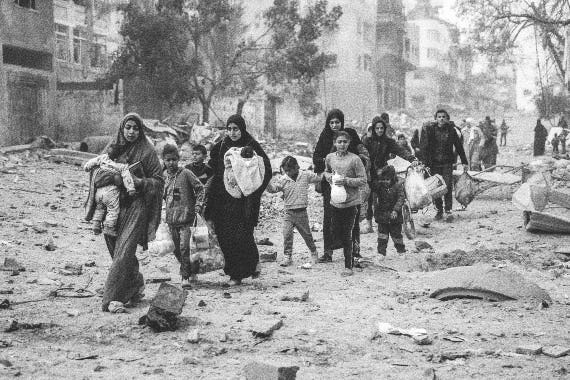Through the Screen
The screens buffer, but Gaza does not. Hospitals burn without loading, families fall silent without captions.
They tell us not to look too long,
at the child in the rubble,
at the mother’s howl
caught mid-breath,
her grief pixelated
for our comfort.
The experts call it vicarious trauma,
as though our hearts
could fracture like theirs,
as though our witnessing
could hold the weight
of the cratered earth.
But what is trauma
when it doesn’t bleed?
When it clicks away
to the next headline,
a slideshow of suffering
we can pause or rewind?
The screens buffer,
but Gaza does not.
Hospitals burn
without loading,
families fall silent
without captions.
We mourn in curated doses,
our guilt anesthetized
by expert voices:
“Self-care is important.”
Drink water.
Log off.
Forget.
But what of the bodies
we never saw?
The stories unframed,
unsanitized,
the cries
that echo beyond pixels,
untranslated,
unheard?
This is not vicarious trauma.
This is complicity,
a spectator sport
where the silence of viewers
feeds the fire,
where the luxury to look away
is the loudest violence of all.
The NPR article this poem was triggered by explores the concept of vicarious trauma experienced by people exposed to graphic images and videos of war, particularly the ongoing conflict in Gaza and Israel. It highlights how constant exposure to such content through news and social media can lead to stress, anxiety, and secondary traumatic responses, even for those far removed from the physical violence. Experts interviewed in the piece emphasize the importance of setting boundaries around media consumption and practicing self-care to avoid becoming overwhelmed.
The article frames this phenomenon as a psychological response to the intense and often horrifying visual narratives of war, raising questions about how much suffering we can—or should—witness from afar. While it acknowledges the importance of staying informed, it also encourages readers to balance empathy with personal well-being, creating a tension between the need to bear witness and the privilege of disengagement.
I have trouble with this framing, questioning whether such responses unintentionally downplay the responsibilities of those who have the choice to "log off" and the implications of turning suffering into consumable media. It calls attention to the disparity between the lived trauma of those in Gaza and the insulated experiences of viewers who can scroll away from discomfort.





